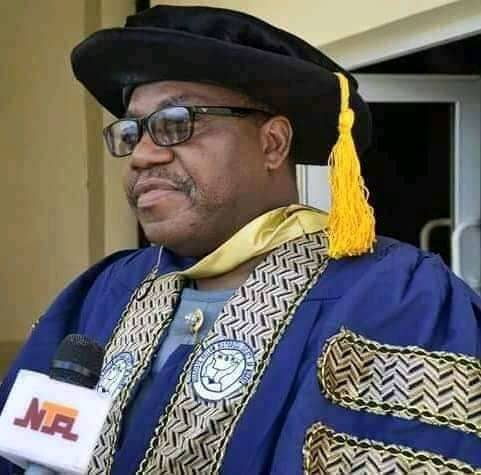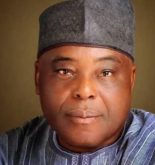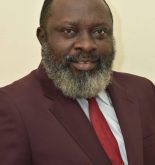By Godknows Igali
The global community was recently thrown into intense melancholy as the gates of eternity opened to Dr. Madeleine Albright and Professor Grace Alele-Williams, two of humanity’s greatest matriarchs that ever lived. In a seeming relay, the former died on 23rd March 2022 in Washington DC, the United States capital, shortly followed by one who could rightly be called her sister, on 25th March, 2022 in Lagos, Nigeria’s commercial capital. As both sad events occurred in the month of celebration of womanhood, the tributes in their memory have resonated with deeper appreciation. This is even more so as the United States Senate, just days after, confirmed the nomination of the first black woman, Ketanji Brown-Jackson to the country’s Supreme Court, 250 years since existence of that institution.
Twined Crystals of Life
Several common cords tied both Albright and Alele-Williams in all aspects of life. Although the former made it to 84 years which is much higher than the life expectancy of women in her country, which currently stands at 81 years, her Nigerian counterpart held strong to a whooping figure of 89 years, almost doubling the 54 years average for Nigerian women. Much more than that, both of them were outstanding mothers of three and five children respectively. They successfully combined parenting with stellar brilliance, the rigours of professions, public life, scholarship and research. They were both pathfinders of exceptional genre in their life’s works in pursuit of goodly human existence, knowledge and scholarship.
Both Albright and Alele-Williams reached the apogee of their careers. Both of them, outstanding scholars and professors, left their imprints in the world of scholarship and knowledge in an aspect of life that is largely male dominated even in the most developed economies of the world.
However, in this shared legacy of trailblazing, Alele-Williams differed slightly from Albright as she was never in the political fold unlike the latter who was deeply involved in America’s Democratic Party and national politics from a very young age. On her part, the Nigerian heroine pursued academia and academia for all that it is.
Czech-Jewish-American
Albright’s great impact on scholarship first came about in 1982 when she took up a job at the Ivy League Georgetown University, located in her country’s capital. At Georgetown, her academic work covered foreign policy, foreign service, international law, diplomacy and public policy. She carved out a place of reckoning in all of these areas as one given to assiduous pursuit of learning; possessing unwavering studious instincts. She left behind a record as amongst the greatest scholars which the institution has ever produced. Afterwards, at a time in her public career, she was also appointed a Professor of Political Science and International Relations at the prestigious Harvard University and there, tutored some of those that came to define America strategic interests during the years of the Cold War and the East-West rivalry.
Albright’s steady rise in scholarship and later on politics saw her become the 64th Secretary of State of the United States of America and served from 1997 to 2001. She was the first woman to hold that position. But even before then, she had become the American Ambassador to the United Nations from 1993 to 1997, a position that had only been occupied by 19 men before her, since the country’s founding in 1776. Beyond mere symbolism of office, at these high levels of global service, Albright was perhaps one of her country’s greatest diplomats ever as she had to deal with all the plethora of global issues that came up with the collapse of the Soviet Union and end of the cold war in the early 1990s.
It was under her, that America consolidated itself as the sole super power in the world following the dissolution of the Soviet Union during that era. With sufficient national security background, having earlier served in America’s National Security Council during the President Jimmy Carter days (1977-1981), she also played a great role in bringing down the tempo of post-cold war nuclear race and achieved considerable mileage especially on the issue of disarmament and reduction of nuclear warheads. Another great impact which she left in global diplomacy was her robust effort in gender mainstreaming. She fought for the rights of women, and interpolated it as a thematic agenda both at the UN and as a critical component of American global politics; even as the Millennium Development Goals (2000) were being negotiated.
Albright’s meteoric rise in life actually belies the cradle of her journey as the child of a once fleeing Jewish immigrant from Czechoslovakia (now broken into Czech and Slovak Republics). So her name at birth was typically Slavic name, Marie Jana Korbelova. Her father, Josef Korbel had actually escaped from Czechoslovakia when his both parents were killed during Adolf Hilter’s holocaust which took place around Europe between 1941-1945 and exterminated, most poignantly, about 6 million Jews. Korbel himself, a career diplomat at the Czechoslovakian Embassy in Belgrade, Yugoslavia at the advent of World War II in 1939 fled with his family, including the two years old Madeleine to the United Kingdom. There, he worked with dissident groups who fought against the Nazist occupation. At the end of the war in 1945, he returned to Prague briefly and got back to the pinnacle of his career, this time returning to Belgrade as his country’s Ambassador. But following the Communist takeover of his country in 1948, for the second time in his life, Korbel and family had to seek for political asylum. This time, in the United States.
Albright’s cradling years in life were therefore obviously troubling, emotionally puzzling and uncertain in no less manner as the current 84 million refugees around the world, of which half are children as she was. Thereafter, her father settled and naturalized in the US and took up job as a Lecturer, Professor and became an academic mentor to several great American citizens. These includes the famous Condoleezza Rice, who was the first woman to become National Security Adviser of the world’s super power. She is also remembered in Nigeria as present during the last moments of late Chief M.K.O. Abiola, supposed winner of Nigeria’s June 12, 1993 presidential elections.
No doubt, her father’s rich professional and academic credentials certainly rubbed off on Albright. However, she had to create content for herself as a highly focused and reputed scholar, topping her class at the various places where she studied. These include the Wesley College, a private women liberal Art Seminary in Massachusetts established since 1870. Thereafter, she proceeded to John Hopkins, itself a private Ivy League university of 146 years standing in Baltimore. With a motto: “veritas vos liberabit” “the truth will set you free”, it is today, regarded as one the most priced academic institutions in the world. Furthermore, she went to the self-styled “Big Apple”, New York City to bag a Master’s Degree and a Ph.D from Columbia University in 1975. It is worthy of mention that since its establishment in 1754, Columbia also has remained a foremost place of scholarship and is regarded one of the most prestigious tertiary institutions in the world. It is people like Albright that have helped that academic institution to have a large endowment of as much as $13 billion which is more than a quarter of Nigeria’s current external reserve.
Interesting enough, several great Nigerian diplomatic ideologues and internationalists such as Prof. Ibrahim Gambari, current Chief of Staff to the President of Nigeria and Prof. George Obiozor, one time Nigerian Ambassador to Washington and currently, Chairman of the pan-Igbo flagship, Ohaneze Ndigbo are all products of that institution.
Indeed, with Gambari, she shared great interface as contemporaries in Columbia as both did their Master’s and Ph.Ds at the same time. The relationship continued in terms of academic work, diplomacy and international relations, including representing their respective countries in the United Nations, becoming Foreign Ministers and co-Chairing the Albright-Gambari Independent Commission. Hence, Gambari’s tribute to his friend and former colleagues was terse: “dignified, compassionate and devoted to her country and multilateralism”.
Amongst other things, Albright was a scholar and research fellow at America’s leading think thank Woodrow Wilson International Centre for Scholars (Wilson Centre), named after the country’s 28th President. She also had her time at the Smithsonian Institution, itself a major nerve centre for knowledge diffusion, established in 1836 and named after the great scientist, James Smithson.
Unfortunately, on the down side of her achievements, Albright flip flopped on the issue of genocide in Rwanda in 1994, leaving a stain on her exceptional service record. Under her leadership of American external policy apparatus at the UN, the Security Council failed to take early decision to stop the fratricidal bloodletting in that Central Africa country. A spectacle which seemed to have haunted her conscience for no few years.
About Bright and Graceful Itsekiri Jewel
In scholarship, Grace Alele-Williams was of unparalleled mien as she became the first Nigerian woman to receive a Doctorate degree in Mathematics; a feat she accomplished at the University of Chicago in 1963. Thereafter, she worked as a post-doctoral fellow at the University of Ibadan before moving to University of Lagos as a Lecturer in 1966. In mathematics, a rare discipline which many women still dare to venture into, she also worked closely with the African Mathematics Programme which was established in 1972 at the Massachusetts Institute of Technology (MIT). She later became an leading author in producing mathematics texts for students.
Her greatest breakthrough in scholarship came about with her appointment in 1985 as the Vice Chancellor of the University of Benin, Nigeria’s 4th oldest university. Again, she was the first woman to record that feat in Nigeria, and perhaps all of sub-Sahara Africa.
Apart from her research and lecturing responsibilities, at different times she held management positions in the university system at UNILAG but focused her work on proselytizing the knowledge of mathematics in Africa, especially among the womenfolk. In this, she followed the tradition of the world’s first female mathematician and philosopher, Hypatia (355-415) who coincidentally was also an African from Alexandria in Egypt. In more recent times, the life story of Alele-Williams compares with two great African-American pioneer women mathematicians. First is Mary Jackson (1921-2005) who by 1951 was on the National Advisory Committee for Aeronautics in 1958 and became the first black female engineer in the famous space agency, NASA. Second is Catherine Johnson (1918-2020) whose works on orbital mechanics also in NASA counts in a critical way in America’s space programme.
Because of her professional achievements, she also served as the first woman ever to be elected as President of the African Mathematics Association based in Rabat, Morocco. At some time later in her career, she was equally chosen as the Regional President for Africa for Third World Organization for Women in Science and also was the Chairman of the African Mathematical Union Commission for Women in Mathematics. Furthermore, Alele-Williams was a member of UNESCO Institute for Education; serving on the Council for 10 years.
For her numerous contributions, she received the highest distinctions and accolades including Fellowship of the Mathematics Association of Nigeria (FMAN), Fellowship, Nigerian Academy of Education (FNAE). She was also honoured with the national award of Officer of the Order of the Niger, OON. As a matter of fact, on the occasion of the celebration of Nigeria’s centenary, held on the 18th of January 2014, she was recognised by President Goodluck Jonathan as one of the 100 most accomplished citizens ever. Back home in the creeks of the Niger Delta, she was also honoured in the palace of the Olu of Warri, Delta State of Nigeria, as a High Chief of her own Itsekiri ethnic nationality.
Out of dint of brilliance and outstanding academic performance, she was one of the early students at the Queen’s College, Lagos, an institution that was built by British colonial administration in 1927 for all-girls education. It is to her credit that she left with the highest level of distinction and stood out in her pioneering efforts in the sciences at a time when most female students were diverted to the Liberal Arts and Humanities. Thereafter, she proceeded to the University of Ibadan to pursue her First and Master’s degrees in Mathematics, before proceeding to the University of Vermont as a Graduate Assistant, and then continuing for her doctoral studies in Chicago.
In a predominantly patriarchal society, many have criticised her dogged Thatcherite attitude to leadership. Out of pursuit of discipline and moral rectitude, she was adjudged high-handed and uncompromising. But this remains debatable as it helped her get things done, especially in a place as University of Benin, considered at the time as impossible to administer and exit from the grip of violent cultic activities.
In All
Against the backdrop of gaping prejudices, biases and inequalities on gender basis, some of the greatest impacts on human society continue to be made by no few women of candour and extraordinary strength. Often unnoticed, unrecorded and uncelebrated, through hushed tone, accounts of exceptional triumphs and accomplishments of womenfolk abound. From current American Vice-President, Kamala Harris to the dedicated, intrepid mother in rural Africa, these women continue to follow, intuitively the words of Audrey Hepburn “I believe in being strong, ….. when everything seems to be going wrong, I believe that tomorrow is another day.” At the end of the day, they make true that “women are the real architects of society”.
When the history of the world is written, Madeleine Albright and Grace Alele-Williams will not only be mentioned as amongst the greatest females ever, but will also be remembered in the pantheon of the most accomplished pathfinders for humanity. They will be venerated, be beautified and canonized in the hearts of all, even many generations unborn. They will eternally be celebrated as people that got things going and going very well. After all, as former British Prime Minister, Margaret Thatcher, once said, “if you want something said, ask a man, if you want something done, ask a woman”.
Having done their bits, they have departed to rest, for other women, including those unborn, to continue the labour.
Adieu, dearest mothers.
Igali, a former Ambassador is author of the 2015 award winning book, “Perspectives on National State Formation in Contemporary Africa”.




